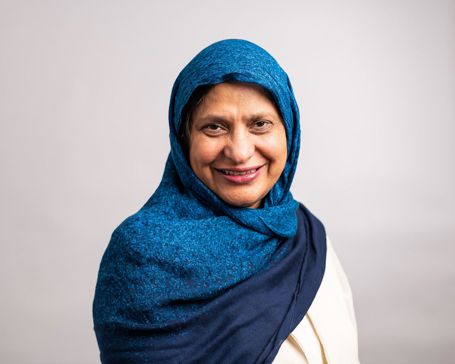Professor Amtul Carmichael, Consultant Oncoplastic Breast Surgeon, is on a mission to get women across the West Midlands talking about and recognising the symptoms of breast cancer.
To kick off Breast Cancer Awareness Month, Prof Carmichael has shared her top tips for recognising the condition and what you can do if you think you are at risk. One in seven women will be diagnosed with breast cancer in their lifetime. “I’ve been working as a specialist breast surgeon since 2004 and have helped thousands of women beat breast cancer,” she explained.
“Knowing what to look for is key and makes an enormous difference when it comes to treating the condition. The earlier you speak to someone, the stronger your chances are of recovery”.
She added: “Breast cancer usually presents as an uncontrolled growth of breast tissue which forms a lump. This is probably the most common symptom I see in my patients and is usually how the cancer presents in its early stages.
“If not diagnosed and treated, the cancer continues to grow and spreads to other parts of the body, usually the lungs, liver and brain.” In the UK alone, one in seven women will be diagnosed with breast cancer during their lifetime according to date from Cancer Research UK.
Though breast cancer survival has doubled in the last 50 years, Prof Carmichael believes that getting younger women talking about the condition, could make all the difference. “Allow breast cancer most commonly occurs in women over 50, it would be a mistake to think that younger women are immune.
“I am seeing younger women in my clinics so it’s vital that we start to get younger women thinking about the science and symptoms of breast cancer.” Prof Carmichael went onto say: “I think a number of factors play into women finding it difficult to talk about the topic. To some it's embarrassing and to others cultural issues impact their ability to access services.
“That’s why checking regularly for lumps or looking out for any changes in the shape of the nipple are so important.” A key part of Prof Carmichael’s personal campaign is symptom awareness.
Understanding the signs to look out for can make a real difference in beating the disease early. To help and give Women a better understanding, Prof Carmichael has outlined the most important symptoms to look out for, as well as some guidance on managing breast health.
Professor Carmichael’s top five symptoms:
- Breast lump–“Not all lumps are cancerous, but any new and pronounced lump on the breast or near the armpit that is firm when pressed should be reported to your GP.”
- Shape of the nipple- “The nipple can often appear as indrawn and may alsoaccompany bloodstained discharge.”
- Breast shape-“This symptom can affect one or both breasts. Similar to the nipple, a noticeable change in the shape over a period is an important symptom.”
- Swelling and discoloration of the breast skin–“This symptom usually gives the appearance of bruising or noticeably different colour to the rest of your skin.”
- Dimpling of the breast-“This is not always a cause for concern but is a common symptom for inflammatory breast cancers. The skin appears sunken and pitted with an uneven texture.”
What should I do if I think I have breast cancer?
“The first thing to remember that even if you have one or more of these symptoms, it doesn’t necessarily mean you have breast cancer. The important thing is that you are aware of the changes to your body.
“Early diagnosis is key to successful treatment, so making an appointment with your GP is an important first step. Make sure to communicate that you know these symptoms could mean breast cancer. Your will then be seen in one of the many two-week breast clinics.
“At the clinic, you will see a specialist cancer surgeon who will conduct further examinations. This will involve a mammogram or an ultrasound. Should they detect any abnormalities, a needle sample will be taken – this is called a biopsy and are generally available within two weeks.”
Professor Carmichael’s top five tips for managing breast health:
- Be Breast aware-“Knowing the signs and symptoms may not feel like a lot, but it can make a tremendous difference to being able to spot a change in your body early. Being breast aware is also talking to friends and family about the symptoms, creating a safe space to talk about breast health is essential to raising awareness.”
- Knowing your body- “You know your body and what it looks like. Performing a simple self-examination of your breasts once a month to check for bumps, changes in nipple shape and overall appearance is a highly effective way of catching any changes early.”
- Attend your breast screening-“Under the NHS Breast Screening Programme, women aged between 50 and 53 will be invited to their first routine scan. This will continue every three years until they are 70. It’s really important to attend that screening when you are invited. If you haven’t been contacted speak to your GP and make sure they have your details.”
- Exercise-“Walking 30 minutes a day at least 5 days a week can have a massive impact on your breast health. Research has shown that the higher our fitness levels are the less likely you are to develop breast cancer later in life. Just a little exercise can go a long way.”
- Diet-“Your body is like a machine. Giving the right fuel helps it run at its best. A balanced diet, which includes five portions of fruit and vegetables per day helps boost your body's immune system, reducing the risk of cancer ”











